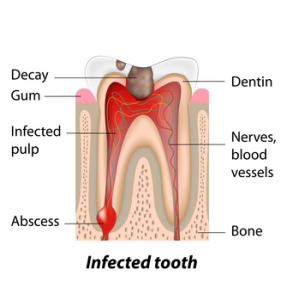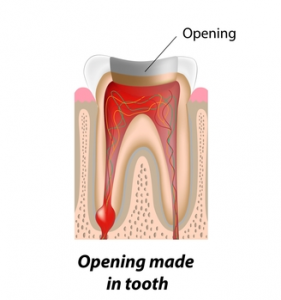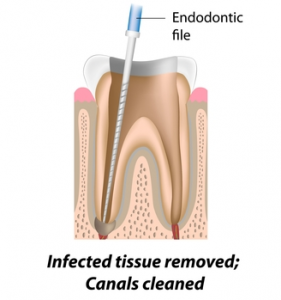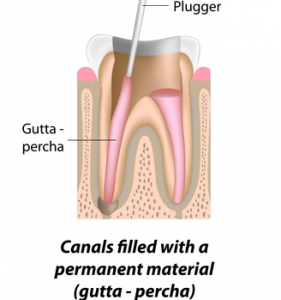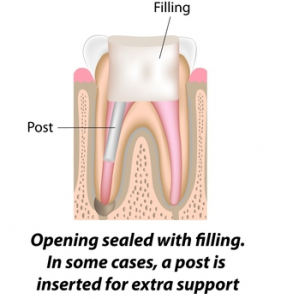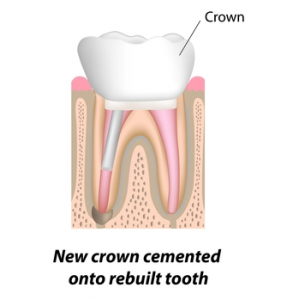
What is endodontic treatment?
Endodontic treatment is the technical name for the dental procedure commonly referred to as ‘root canal treatment’ or ‘root filling’. The word Endodontics originates from the Greek words ‘endo’ meaning ‘inside’ and ‘odont’ meaning ‘tooth’. Thus endodontic treatment refers to treating the inside of the tooth.
Root canal treatment is performed when the tooth’s pulp (sometimes referred to as the nerve) has become diseased or infected. Root canal treatment involves cleaning, shaping and filling the inside of the tooth to make it disease-free and functional again.
Why do I need endodontic treatment?
You may need root canal treatment if the tissue inside your tooth, the pulp, becomes inflamed or infected. The inflammation and infection may be caused by deep decay, a crack in the tooth, leakage around a filling or as a result of trauma or a knock to the tooth.
If an infected tooth is left untreated it can cause pain, develop an abscess and also bone loss around the root. The signs of an inflamed or infected tooth can be lingering pain, sensitivity to hot or cold, swelling and tenderness, pain to biting or discolouration of the tooth. In some cases there are no symptoms at all. Endodontic treatment gives us an opportunity to retain natural teeth that would otherwise have to be removed because of this disease or infection.
Is root canal treatment going to hurt?
We understand that teeth requiring endodontic intervention usually present as severe pain or swelling from severe inflammation or dental infection. However, there are also other sources of pain that may manifest as a toothache. We will spend time with you to determine the cause of pain and discuss your treatment options with you. If endodontic treatment or root canal treatment is required, we will ensure that your tooth is profoundly anaesthetised prior to commencement of treatment to ensure your comfort during treatment. Post-operative measures will be taken to miminise any discomfort you may experience after you leave our practice.
What is an endodontist?
An endodontist is a dental specialist who has completed additional three years of further study and training in the area of infectious disease inside the tooth and its surrounding structure. Essentially an endodontist is a root canal specialist. In addition, endodontists are also trained to diagnose facial pain and to manage dental trauma. All dentists are trained to perform endodontic treatment; however, not all root canal treatments are the same. A dentist will refer to an endodontist when a case or a tooth is too complex to manage in a general practice setting.
Can all teeth be treated?
Most teeth with infected or diseased pulp can be treated with root canal treatment. Teeth that are severely broken down, have advanced periodontal (gum) disease or have extensive fracture may not be suitable for root canal treatment. At the initial consultation, an assessment of the suitability of each tooth for treatment is made. Alternative treatment options are discussed and considered. The suitability of the tooth is also reviewed during the course of treatment.
Why do some teeth require further treatment or retreatment?
Root canal treatment enjoys a high success rate and most teeth that undergo treatment are retained for many years after. However, as with all dental and medical procedures, there are circumstances when healing does not proceed as initially anticipated. Persistent disease after treatment may occur as a result of breakdown in the restoration over the tooth or new areas of decay that have developed around the tooth. Reinfection may result from a delay in the placement of the final restoration after root canal treatment. Persistent disease may also occur because some canals are difficult to locate or prepare during the initial procedure. Many of these cases can be treated by removing the original root fillings, disinfecting and sealing the canals again.
What is Endodontic Surgery?
Endodontic surgery is a procedure that is carried out if there is persistent inflammation or infection of the bony tissue around the end of a tooth. The most common endodontic surgical procedure is called an apicectomy and it is generally performed after root canal treatment or non-surgical retreatment. In some cases, endodontic surgery will be performed as an alternative to non-surgical retreatment if the canal space is inaccessible because of blockages or extensive restorations. The endodontist will remove the infected tissue and in some cases will remove some of the very end of the root tip and place a small filling at the end of the tooth to seal the root canal.
Root Canal Treatment
